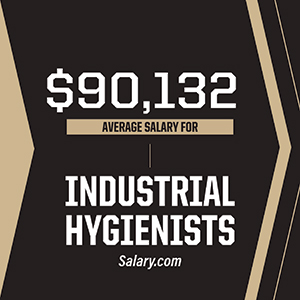
About Us
Occupational and environmental health sciences professionals protect individuals from possible health effects caused by environmental hazards, such as lead or air pollution. Purdue’s Occupational and Environmental Health Sciences (OEHS) graduate program, which specializes in industrial hygiene, offers both Master of Science (MS) and PhD degree programs.
Our mission is to train our graduates to be professionals, leaders and researchers in industrial hygiene and related fields. The program will prepare you with the knowledge and skills to be an outstanding scientist and protect workers, families and communities from hazardous environmental agents and workplace stressors.
What Do Industrial Hygienists Do?
Company’s bottom line through increased productivity, improved morale, and lower workers’ compensation and liability costs. Industrial hygienists act as advisors, making recommendations and setting standards to keep the workplace safe. As an industrial hygienist, you’ll work with employees of all job levels with a genuine commitment to the well-being of individuals and the environment. Learn more about industrial hygiene career opportunities.
Industrial Hygiene at Purdue
Our MS program is accredited in industrial hygiene through the Applied Science Accreditation Commission of ABET. Our program is the only one in the nation that is ABET accredited in industrial hygiene at both undergraduate and graduate levels.
Many of the students who enter our graduate program hold an undergraduate degree in biology, chemistry, biochemistry, industrial hygiene, environmental health science or other related disciplines.
The MS in Occupational and Environmental Health Sciences is recognized as a Qualified Academic Program (QAP) by the Board of Certified Safety Professionals (BCSP), meeting the qualified credential requirement for the Certified Safety Professional (CSP) certification.
Our Graduates
Industrial hygienists from our program are professionally qualified by their master’s or PhD education and training to anticipate chemical, physical, biological and radiological hazards and to develop systems in occupational and environmental settings.
Upon completion of our graduate program, industrial hygienists typically assume leadership roles within academia, industry, labor and government. Graduate training also is a key step toward obtaining the Certified Industrial Hygienist credential, which opens up additional career opportunities.
